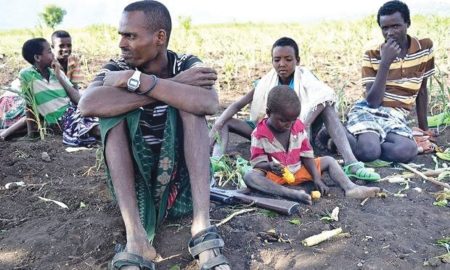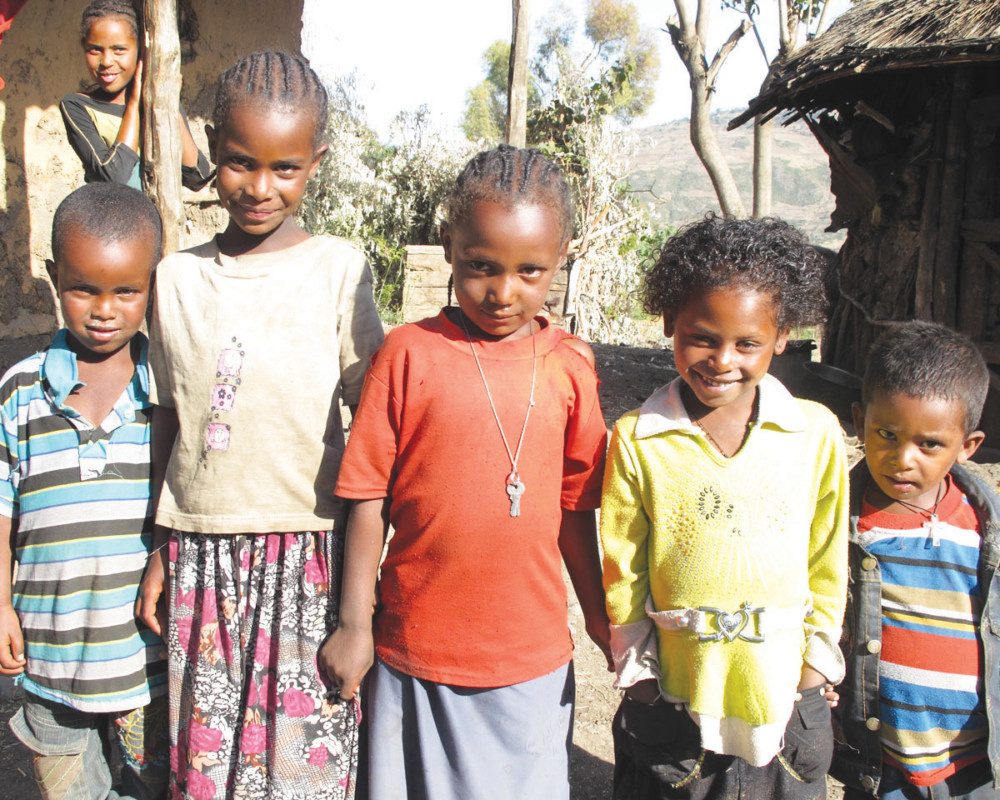The boy’s shadow flickers gently, almost sleepily, as the flame of the oil lamp projects it against the stark brick wall of the room. Under the lamp’s light, Tolaa sits at the table in his small home, trying to read the words in his notebook – but weariness is claiming his thoughts. After getting up early for prayers, along with most Muslim men in his village, helping his father Coqorsoo look after their crops and animals, going to school, and then returning home to continue with farming and other duties, further studies, prayers, etc., Tolaa is ready for bed.

Although often weary, Tolaa is happy to be able to attend school in his village this year: half of all Hararghe Oromo children do not attend primary school. He wonders if he will have the same privilege next year… or even follow his brother Beekaa, who has gone on to high school located in the bigger town. Beekaa stays with their uncle and helps in the family store there.
Tolaa knows his father is very proud to have a son in the high school. Every afternoon, Coqorsoo likes to meet in a corner of the market with other village men to sit in a circle, chew khat (a mild narcotic) and talk about disputes, deaths, weddings, and economics – but Coqorsoo also likes to talk about his son in high school. Only about one in ten students attends secondary school. Tolaa wishes he could listen to their conversations, but he doesn’t like khat.
Many men, women and even some youth and children chew khat. It’s supposed to make a person feel better, so they say, but Tolaa has some reservations. He tried stuffing the khat leaves and twigs into his cheeks, but it was too uncomfortable and he didn’t feel well after chewing it. He has also seen what it does to his father, who is addicted to chewing khat: he’s thin, often depressed, has hallucinations, and the doctor says he has high blood pressure from it.
Blinking a few times and stifling a yawn, Tolaa closes his notebook, rises and says good night to his mother Latuu. She is alone in the kitchen (his sister would have been helping but she died last year of complications with malaria) preparing some food for his father to eat when he gets home. Tolaa turns to walk drowsily to his small bed in the darkness of the back room. “Will I even be able to finish primary school?” he wonders.
Since Beekaa left, now more than ever Tolaa is needed at home to help his father. It’s also costing the family dearly for their sons’ education. Father says that with the low and unpredictable rainfalls over the last few years the maize, sorghum and vegetable crops have not had enough water to grow properly. There’s not enough to sell in the market and so less money for schooling.
The water shortages have affected many Hararghe Oromo because more than 80% are in farm-related livelihoods; some of the people are strict pastoralists and count on their livestock having ample water and pasture. This year alone tens of thousands of Hararghe Oromo have had to rely on international food aid. Tolaa ponders all this as he drifts off to sleep.
Tolaa and Beekaa are Oromo, but they speak the Eastern dialect and so are known as Hararghe or Barentuu Oromo – one of the divisions of the Oromo people. A mostly rural people, they live primarily east and southeast of the geographically centralized capital of Ethiopia, Addis Ababa. They are a people group of about 6 million and almost 97% practice Sunni Islam, often mixed with ethnic religious beliefs. Fewer than 1% are Christian.
Pray for the Hararghe Oromo
- Pray the Lord of the harvest to send more workers among the Hararghe Oromo people. Pray that more Ethiopian churches will have God’s heart for the Hararghe Oromo and send their own workers to share the gospel in humility and love.
- Pray for God’s Word to be translated into Hararghe Oromo. While the whole Bible is available, a new version is needed because the alphabet used in this older translation is different from the one currently taught. Pray for the development of the oral Bible for the many who do not read well. Pray that Hararghe Oromo would receive the Bible as God’s Word for their people.
- Pray for the emerging body of believers among the Hararghe Oromo to be spiritually strengthened, to grow in their understanding of their identity in Christ, and to be equipped to see their people come into God’s Kingdom. Pray that neighboring people groups such as the Somali and Afar would also be reached as a result of what God is doing among the Hararghe Oromo.
